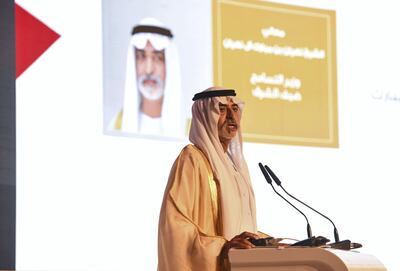Arab women should have the right to marry foreigners and pass their citizenship on to their children, according to a charter launched in Abu Dhabi on Tuesday.
The Arab Charter of Women’s Rights aims to ensure Arab women’s rights are upheld across the Middle East and North Africa.
It was drafted by the Arab Parliament, the legislative body of the Arab League.
The charter comprises 25 articles that tackle issues from mandatory education and health care to work opportunities and free services for new mothers. It will serve as a guideline for member states with an aim to inform legislation.
“I hope that launching this declaration serves as a deterrent against claims regarding women’s status in Arab societies,” said Sheikh Nahyan bin Mubarak, the Minister of Tolerance, on behalf of Sheikha Fatima bint Mubarak, the Mother of the Nation, as he launched the charter on Tuesday.
He called on representatives of member states to study their country's laws and determine any changes that need to be made to ensure women's rights are met.
“We are in an age where every individual is capable of making change; every man and woman has the freedom to learn and work, and I call on you all to let the woman be part of this and contribute to achieving peace and development in our societies.”
On marrying men with a different nationality, the charter says Arab women should have the right to retain their citizenship. Should a woman wish to acquire her husband's nationality, she should have the option of restoring her original nationality in case of divorce or his death.
The charter also touches on the nationality of children with parents from different countries. It says women should be able to pass their citizenship to their children.
Typically, in the Middle East, children inherit their father’s citizenship.
Children born to Emirati mothers and foreign fathers are not automatically entitled to UAE citizenship.
They take the nationality of their father at birth and since 2011 have been entitled to apply for an Emirati passport when they turn 18.
Recent changes to the law say their mothers can now apply to have citizenship bestowed on their children when they turn six. The process has been made quicker in recent years and in May, 3,354 sons and daughters of Emirati women married to foreign fathers were granted citizenship by the government.
Jasim Al Naqbi, a member of the legal and human rights committee at the Arab Parliament and the UAE’s Federal National Council, said the granting of citizenship is becoming more straightforward, particularly “if the father and the children apply together as a family".
"And I know a number of cases who applied and got it," he said.
The Emirates also tend to grant UAE citizenship to the children of Emirati women and non-Emirati fathers when the father dies or the couple divorce.
He said the reason this only applied after divorce or death was to not contradict a UAE law that says children can inherit only their father's citizenship.
The charter explains that before applying for citizenship on behalf of a child, the parents' national laws must be considered.

Member states are expected to sign the charter during the next Arab League meeting. Signing it, however, does not oblige participating countries to change their laws to abide by the charter.
"It is a charter for all Arab parliaments to take as a guideline while shaping their legislation," Mr Naqbi said.
Dr Amal Al Qubaisi, President and Speaker of the FNC, said the charter took two years to draft.
“The UAE was taken as a model [while drafting the charter] in empowering women and making decisions that guarantee their rights," she said.


